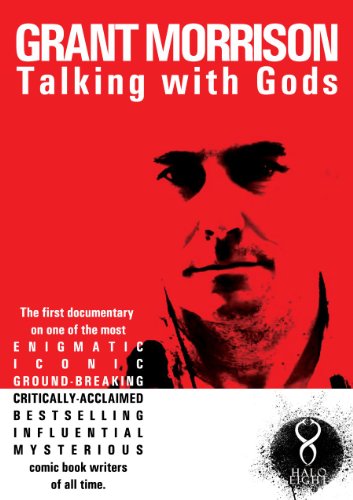Grant Morrison – Talking with Gods
Reviewed by Peter Campbell 04-Mar-11
Grant Morrison is one of those people who would be interesting enough to carry a documentary were you to point a camera at them and let them talk. Which is just as well, because that’s what this documentary basically consists of.
Grant Morrison is one of those people who would be interesting enough to carry a documentary were you to point a camera at them and let them talk. Which is just as well, because that’s what this documentary basically consists of. And he talks magnificently. He talks about his childhood, and chaos magick and drugs and about his alien abduction and comics and…you gain the impression it’s a game, a cover-up. “Grant Morrison’s greatest creation is himself,” the documentary announces, right at the beginning.
The events covered here are roughly chronological, starting from his childhood years (anti-establishment father, heavily involved with anti-nuclear activism, prone to breaking into military establishments.), to teenage years (comic book geek), to what seems like an extreme and belated form of teenage rebellion in which he travels the world discovering drugs and sex and the counterculture. This is the moment in which the Grant Morrison as we have come to know him emerges: bald-headed, sharply-dressed, a little eccentric. Then there’s the comedown: darker years, and, after his marriage, a time of stability.
What comes across most clearly throughout all of this is how driven Morrison is. He may have a space cadet reputation, but someone who was permanently off his trolley simply couldn’t have produced the voluminous amounts of comics that he’s managed to write over the years. He’s pragmatic. He wants something: he goes for it, obsessively, until he achieves it. He wants to be a comic book writer? He does it. Travel the world? He does it. Turn himself into King Mob? He does it. How much of this is influenced by Morrison’s interest in chaos magick (which he approaches in a very down-to-earth form) is debatable. You could argue equally that he’s very ambitious and knows how to exploit his image. From the information presented here, you’re never quite sure.
This is all very entertaining and, occasionally, illuminating (until watching this, I hadn’t realised quite how much of a twisted autobiography The Invisibles is, for example). There are hints of seeing a different Morrison at times, one that’s shyer, more sensitive. You wonder how much of the persona he’s built up is a defence mechanism against the attention he’s garnered.
What isn’t discussed very much are the comics themselves. There are brief panel shots, at moments where events in his comics seem to directly parallel those in his life, and superficial mention is made about the work he produces, but otherwise the assumption is made that you’re comprehensively familiar with his work, and its themes. Perhaps there were copyright issues involved, or perhaps it was a conscious decision to aim this documentary at a comics-literate audience. There’s also no hint of criticism of Morrison’s work, as though DC One Million had equal artistic weight to The Invisibles and Doom Patrol. It didn’t prevent my enjoyment of this film, but it does feel like something of a missing dimension and, consequently, something of a lost opportunity.
Patrick Meaney does a competent job of directing this, although it follows a pattern that’s familiar from other, similar, works: the opening roar of approval from the crowd, the delving back into its subject’s roots, and moving forwards again. There’s a large number of friends and colleagues who provide commentary and anecdotes along the way. Some of these are downright inane, and some (Jill Thompson, for example) provide genuine insight.
There’s never any sense that you have ever penetrated the real Grant Morrison at the end of all of this, beyond seeing some unguarded glimpses. That’s probably the result of gaining his co-operation. Those moments you do see suggest that here’s another film that could be made, one with greater depth, one that examines his artistic influences and that analyses his work more fully. That’s not to denigrate what’s been produced here though: this is never less than engaging, and if it’s part hagiography, part sideshow, then on those terms it succeeds. It’s well worth investing your time and money in.
Tags: DVD, Grant Morrison
DC One Million is a work of genius, and even thinking about the finale makes me mist up every time. Never read most of the non-Morrison tie-in issues, obviously, though the Hitman one was excellent.